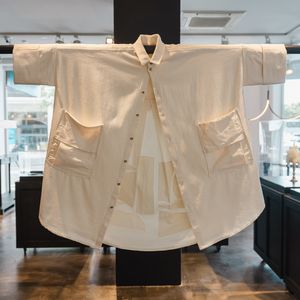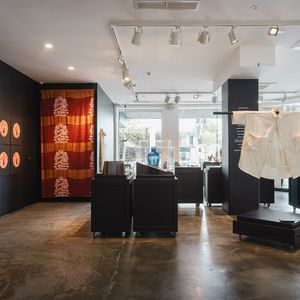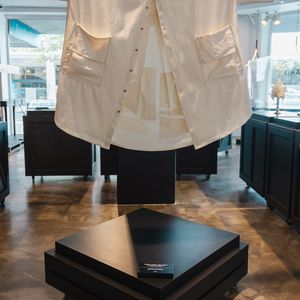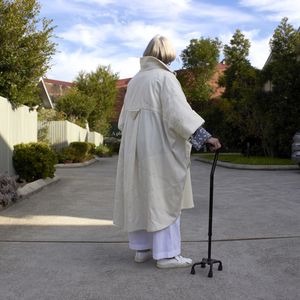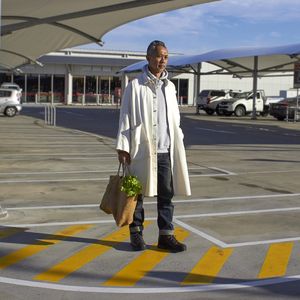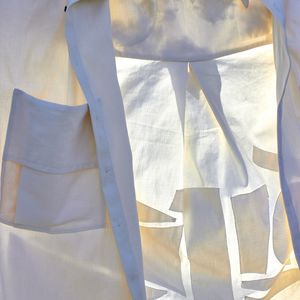Object Podcast Series 3 Episode 2: High Tea with Mrs Woo
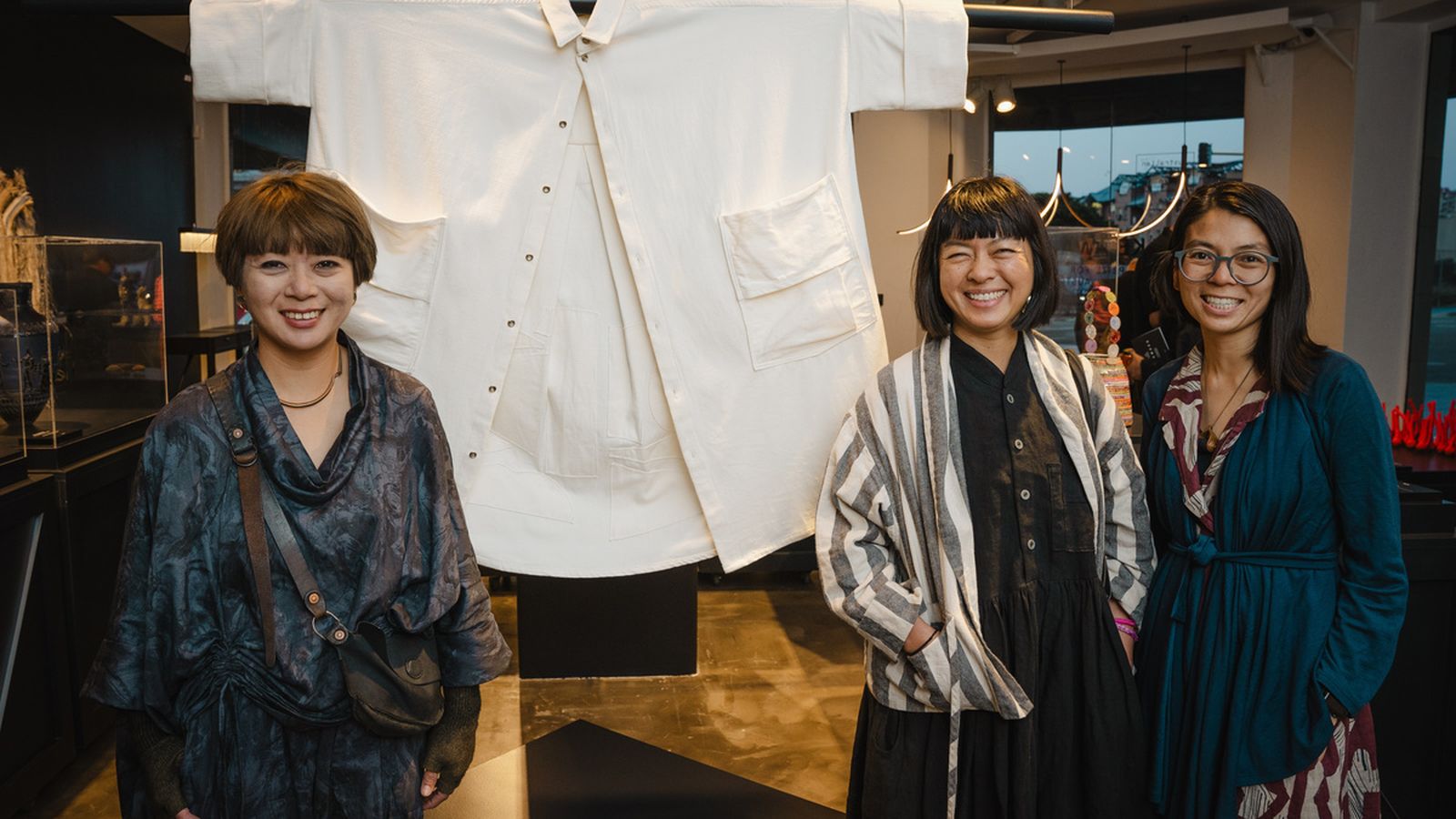
Object Podcast Series 3: Behind the scenes of MAKE Award: Biennial Prize for Innovation in Australian Craft and Design
Episode 2: High Tea with Mrs Woo, Finalists in 2023 MAKE Award
Show notes
Host Lisa Cahill chats with the finalists in the 2023 inaugural MAKE Award, clothing designers High Tea With Mrs Woo.
Rowena, Angela and Juliana Foong are three sisters who run a clothing label that focuses on sustainability and ethical production and who collaborate on design, making, mending and more.
Find out who Mrs Woo is, how the idea for the Resilience Coat came about and about its zero waste features.
Hear from judges Jason Smith, Hyeyoung Cho and Brian Parkes on their work Resilience Coat.
High Tea with Mrs Woo is a sustainable fashion practice, crafting clothes and accessories for modern thoughtful living. Their work features natural fibre fabrics, ethically made, through circular design.
Transcripts
Word document: TRANSCRIPT OBJECT Podcast S3 Ep 2 High Tea with Mrs Woo
PDF document: TRANSCRIPT OBJECT Podcast S3 Ep 2 High Tea with Mrs Woo
Guests
- Rowena Foong
- Angela Foong
- Juliana Foong, collectively High Tea with Mrs Woo
- Jason Smith, Director and CEO of Geelong Gallery, Victoria
- Hyeyoung CHO, Chair of the Korea Association of Art and Design, and expert panel member of the Loewe Foundation Craft Prize
- Brian Parkes, CEO at Jam Factory, Adelaide, South Australia
Show highlights and takeaways
Meet the three sisters [1:30]
Angela Foong starts the episode by jokingly introducing herself and her sisters: “I am the optimist. Rowena, our elder sister, is the realist and Juliana, our middle sister, is the pessimist.”
What they do [1:45]
Angela Foong says they share a common love for clothing and how clothing can be a way we can express ourselves, but also to be really thoughtful in the world.
Their work includes a clothing label, shop, manufacturer, design team, mending, and workshops “that really focuses on sustainability and ethical production”.
Childhood in Malaysia [3:20]
The Foong Sisters grew up around their grandfather’s jewellery workshop in Malaysia. They’d visit their grandparents and extended family every holidays and Chinese New year, and spend a lot of time in the workshop as kids.
Juliana Foong says it sparked an interest in making and the enjoyment of being in a studio and making space.
“Our grandfather was always working with his hands,” she says.
Migrating to Australia [4:00]
Their family migrated and settled in Newcastle, New South Wales. Despite their parents’ hopes for doctors and lawyers, the trio found themselves sewing.
Mum said, “I can't afford to buy clothes, so here's a machine, some elastic, and you make pyjama pants. And that's how we started, ” says Juliana.
Who is ‘Mrs Woo’? [5:00]
‘Mrs. Woo’ is not an actual person but a muse for the sisters. She represents the strong, vivacious aunties in the lives of the Foong Sisters. These aunties - friends of their family in Malaysia - hold a special place in the sisters' hearts, with qualities of strength, boldness and outspokenness.
Awards as a point of review [6:15]
For the Foong Sisters of High Tea with Mrs. Woo, participating in awards is one way to reflect and review their creative work. Rowena says awards, such as The MAKE Award, gives them a set of standards to compare their designs and practices against what's going on in the industry right now.
“Where do we sit, amongst our colleagues? And in the world of making, are we moving forward?”
Jason Smith, MAKE Award Judge [7:20]
Jason Smith, CEO and Director of the Geelong Gallery, comment on their work Resilience Coat:
“It's simple, but complex. It has a remarkable number of sewn finishes. One of the beautiful things about this garment is that it is architectural, but it has a softness. It's very much of the body but in its repurposing and recycling of materials, it heralds a new era.”
Design details [8:40]
Rowena Foong says the coat’s design is an innovation on their existing design, the Undercover Trench duster coat. “It's long, it allows you to fill it out or wear it oversize. There is a sharp collar which you can flip up or have it relaxed. There are recycled brass buttons that come down the front. There's large pockets where you can rest your hands inside. And it has long sleeves to cover your arms or you can roll it back up.”
Australian regenerative cotton crop [9:35]
Cotton has been subject to debates regarding water usage and environmental concerns.
Rather than using conventional processed cotton, High Tea with Mrs Woo used raw undyed cotton. The cotton is grown in St. George's, Queensland, farmed in a regenerative way that promotes soil health and sustainability. The choice of raw undyed cotton emphasises transparency in the supply chain and allows them to trace the material back to its source.
Self-mending coat [10:30]
The Coat has an innovative design for future mending by its owner.
“We've built the garment … with patches that are sewn back into the garment, that future proof the garment,” says Rowena.
Dreaming of a circular economy for clothes [11:00]
Ange says that their dream is that “everything we wear is full cycle, and we have a circular economy for clothing.”
Brian Parkes, MAKE Award Judge [11:30]
Brian Parkes, CEO at Jam Factory in Adelaide, says the Resilience Coat is “beautifully made. The materiality is exquisite. It's work that comes out of a really mature sensibility. They've really found their stride.”
Concept behind The Resilience Coat [12:15]
The concept of the Resilience Coat is connected to a panel discussion on race and belonging. The panel was organised by Hunter New England Health, and the sisters were asked as community members to be panel members, to “contribute what it's like to be a migrant family.”
“It was quite a momentous experience for us listening to this beautiful woman, Juliana Nkrumah, who is the head of the African Women's Association Inc. (AWAU)” says Angela.
“We realised we haven’t actually belonged.” [13:30]
“What was really fascinating and quite emotional for us is that we realised, listening to everyone else on the panel and all the questions as well, is that we haven't actually belonged. And the way we have tried to find a place is through High Tea with Mrs Woo and through making clothing,” Angela says.
‘Every morning I wake up and put on my resilience coat,’ Juliana Nkrumah [14:00]
“The sentiment that Juliana Nkrumah shared with us in this panel, she said in a really strong and brilliant way, ‘Every morning I wake up and put on my resilience coat.’
For the three of us, in that same moment, we all felt that very deeply. “
Finding ways to belong in Australia as migrants [14:40]
Ange reflects that the panel was a great discussion on how, as a migrant, you do need lots of resilience to continue to search for a place to be. She says in Australia, “potentially you may not belong.”
She thinks you might have to find a different way to belong, maybe through creative practice, your work, community events or finding like-minded people.
“Story is pretty much central to everything we do” [15: 25]
For these three passionate sisters, crafting clothing goes beyond mere design and fabrication—it's a form of narrative expression. Storytelling, for them, is not confined to words but extends into the very fabric of their creations.
“Even though we are practitioners in the clothing space and our material is textile, stories just come in so many different forms… it feels really amazing that a piece of textile, a garment or a piece of clothing that someone is wearing can almost bring something out,” Angela says.
Hyeyoung Cho, MAKE Award Judge [16:15]
Hyeyoung Cho notes that the stitching on the Coat “is very unique. They're using a cross between very contemporary styling, but the sewing and the stitching has reference to many different traditional methods.”
Innovation and the MAKE Award [17:00]
The central criteria for the MAKE Award is innovation. Angela says Resilience Coat was an experiment in presenting a new way of thinking and a new way of experiencing clothing in a full cycle.
The role of the wearer is also an innovation - in that the wearer becomes an “active part of the clothing process” because they take on the responsibility of future mending.
She says the wearer can also share the Resilience Coat for family and friends to wear, being a “mixed size, ungendered, un-ageist garment”.
Advice for designers [18:00]
Juliana advises that having a business mind is really important, and to be aware of the complexities involved. Angela suggests that we have to ask the question, ‘What problems can we solve?’ She points out that there are so many problems in the world and we actually don't really need more stuff.
Rowena says it’s important to bring your passion into the business; to really be sure that you're not just designing in a linear way, and that you are trying to solve a problem.
CREDITS
Object is a podcast of the Australian Design Centre. Object is produced by Jane Curtis, in collaboration with Lisa Cahill. Sound engineering is by John Jacobs.
Image episode photo of Resilience Coat is by High Tea with Mrs Woo.
Return to Object: stories of design and craft main page

